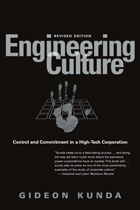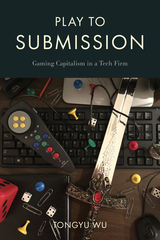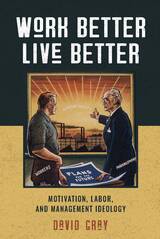3 books about Employee motivation

Engineering Culture
Control and Commitment in a High-Tech Corporation
Gideon Kunda
Temple University Press, 2006
Engineering Culture is an award-winning ethnography of the engineering division of a large American high-tech corporation. Now, this influential book—which has been translated into Japanese, Italian, and Hebrew—has been revised to bring it up to date. In Engineering Culture, Gideon Kunda offers a critical analysis of an American company's well-known and widely emulated "corporate culture." Kunda uses detailed descriptions of everyday interactions and rituals in which the culture is brought to life, excerpts from in-depth interviews and a wide variety of corporate texts to vividly portray managerial attempts to design and impose the culture and the ways in which it is experienced by members of the organization. The company's management, Kunda reveals, uses a variety of methods to promulgate what it claims is a non-authoritarian, informal, and flexible work environment that enhances and rewards individual commitment, initiative, and creativity while promoting personal growth. The author demonstrates, however, that these pervasive efforts mask an elaborate and subtle form of normative control in which the members' minds and hearts become the target of corporate influence. Kunda carefully dissects the impact this form of control has on employees' work behavior and on their sense of self. In the conclusion written especially for this edition, Kunda reviews the company's fortunes in the years that followed publication of the first edition, reevaluates the arguments in the book, and explores the relevance of corporate culture and its management today.
[more]

Play to Submission
Gaming Capitalism in a Tech Firm
Tongyu Wu
Temple University Press, 2024
Games are often a fun perk of a tech company job, and employees can “play to win” in the competition to succeed. But in studying “Behemoth” (a pseudonym for a top American tech company), Tongyu Wu discovered that gaming work culture was far more insidious.
Play to Submission shows how Behemoth’s games undermined and manipulated workers. They lost their work-life balance and the constant competition made labor organizing difficult. Nonetheless, many workers embraced management’s games as a chance to show off their “gamer” identities and create a workplace culture with privileged insiders and exiled outsiders, with female and migrant workers usually in the latter group. Moreover, Wu indicates this may be the future of work for high- and low-skilled and, creative workers in an environment where capitalists have heightened demands for technology and creativity.
Drawing from 13 months of ethnographic work, Wu presents a persistent reality in which the company reaps the reward of surplus productivity, leaving employees themselves in a highly competitive and sometimes precarious work position.
Play to Submission shows how Behemoth’s games undermined and manipulated workers. They lost their work-life balance and the constant competition made labor organizing difficult. Nonetheless, many workers embraced management’s games as a chance to show off their “gamer” identities and create a workplace culture with privileged insiders and exiled outsiders, with female and migrant workers usually in the latter group. Moreover, Wu indicates this may be the future of work for high- and low-skilled and, creative workers in an environment where capitalists have heightened demands for technology and creativity.
Drawing from 13 months of ethnographic work, Wu presents a persistent reality in which the company reaps the reward of surplus productivity, leaving employees themselves in a highly competitive and sometimes precarious work position.
[more]

Work Better, Live Better
Motivation, Labor, and Management Ideology
David A. Gray
University of Massachusetts Press, 2020
In the United States, a strong work ethic has long been upheld as a necessity, and tributes to motivation abound—from the motivational posters that line the walls of the workplace to the self-help gurus who draw in millions of viewers online. Americans are repeatedly told they can achieve financial success and personal well-being by adopting a motivated attitude toward work. But where did this obsession come from? And whose interests does it serve?
Work Better, Live Better traces the rise of motivational rhetoric in the workplace across the expanse of two world wars, the Great Depression, and the Cold War. Beginning in the early twentieth century, managers recognized that force and coercion—the traditional tools of workplace discipline—inflamed industrial tensions, so they sought more subtle means of enlisting workers' cooperation. David Gray demonstrates how this "motivational project" became a highly orchestrated affair as managers and their allies deployed films, posters, and other media, and drew on the ideas of industrial psychologists and advertising specialists to advance their quests for power at the expense of worker and union interests.
Work Better, Live Better traces the rise of motivational rhetoric in the workplace across the expanse of two world wars, the Great Depression, and the Cold War. Beginning in the early twentieth century, managers recognized that force and coercion—the traditional tools of workplace discipline—inflamed industrial tensions, so they sought more subtle means of enlisting workers' cooperation. David Gray demonstrates how this "motivational project" became a highly orchestrated affair as managers and their allies deployed films, posters, and other media, and drew on the ideas of industrial psychologists and advertising specialists to advance their quests for power at the expense of worker and union interests.
[more]
READERS
Browse our collection.
PUBLISHERS
See BiblioVault's publisher services.
STUDENT SERVICES
Files for college accessibility offices.
UChicago Accessibility Resources
home | accessibility | search | about | contact us
BiblioVault ® 2001 - 2024
The University of Chicago Press









